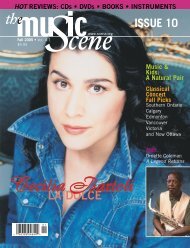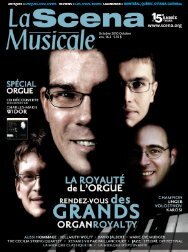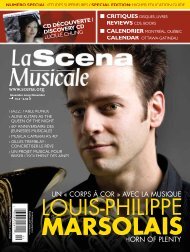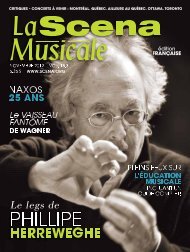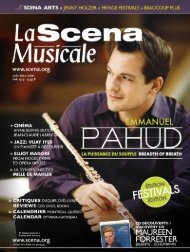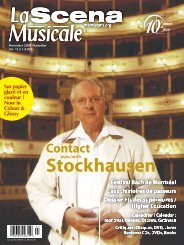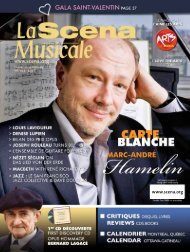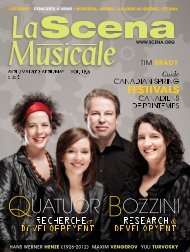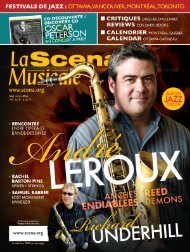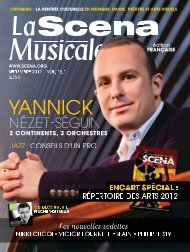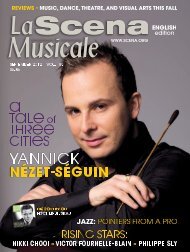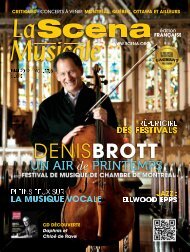You also want an ePaper? Increase the reach of your titles
YUMPU automatically turns print PDFs into web optimized ePapers that Google loves.
INDIE CLASSICAL<br />
willing to rely on shrinking grants, foundations,<br />
and donors take cues from pop’s<br />
cultivation of public support. They develop<br />
more band-like schemes (of course,<br />
the difference between smartening up and<br />
selling out is hotly contested). Mazzoli describes<br />
such an unconventional moneyraiser:<br />
“I’ve been hosting a lot of<br />
fundraising parties. I’ve learned that what<br />
people want more than anything is access<br />
to you and the art in a meaningful way. I’ll<br />
perform a section of a work a month before<br />
the premiere and use this as a way to<br />
talk about the work so that people that<br />
want to contribute to the project feel that<br />
they have a special ‘in’ on it. It breaks<br />
down a lot of barriers, very quickly.” And,<br />
forced to get creative about saving money,<br />
musicians ask friends for in-turn and lowpay<br />
contributions of talent on their projects<br />
instead of hiring externally.<br />
The perceived disinterest from academia<br />
also encourages musicians to look beyond<br />
their music school mentors and<br />
colleagues to find a new community.<br />
Sometimes they look outside classical<br />
music, or even music, sniffing out shared<br />
interests and ideas without regard to professional<br />
fields. Muhly describes such a<br />
self-made community: “I<br />
make music with people I like; I<br />
happen to like lots of different<br />
people. I’d love to collaborate<br />
with an architect! I don’t see it<br />
as any big breaking out or<br />
crossing over [from classical<br />
music].” He may not have<br />
worked with an architect, but<br />
he has worked with a perfumer<br />
to create a ‘scent<br />
opera,’ which premiered at<br />
the Guggenheim. As composers<br />
work with more<br />
varieties and numbers of<br />
colleagues, in turn a wider audience hears<br />
their music—including those that may be interested<br />
in future collaboration. Finally, as<br />
composers write increasingly ‘for themselves’<br />
and their newfound communities of colleagues,<br />
they feel less restricted to styles<br />
favoured by academic grants.<br />
All this alienation and resulting<br />
cross-pollination<br />
encourages a DIY attitude.<br />
“This do-it-yourself movement<br />
has come out recently<br />
out of necessity,”<br />
Mazzoli believes. “You’re<br />
told that classical music is<br />
dead. There are no record<br />
labels or outlets for<br />
your music. Funding<br />
is drying up.<br />
We’ve all heard<br />
that for our entire<br />
lives. So we’re<br />
looking to each other and to different models<br />
of funding and producing concerts. I’m very<br />
happy to be part of a group of young<br />
musicians who are interested<br />
in that, who are banding together to do something<br />
new, interesting and fun.”<br />
Postmodern Playground<br />
MUHLY<br />
“The music that I like the best—<br />
whether it’s classical or pop or<br />
whatever—always has this element<br />
of familiarity mixed with a<br />
lot of great surprises.” — MISSY MAZZOLI<br />
Of course there’s nothing new about the establishment’s<br />
distaste for genre bending or<br />
multidisciplinary exchange. The difference<br />
here seems to be a matter of scale.<br />
“We have a much bigger playground<br />
of information to work with,” explains<br />
Warhol Dervish co-founder<br />
and violist Pemi Paull (an LSM contributor).<br />
“There’s a realization of<br />
how much variety there is in the<br />
world. When I was growing up Ravi<br />
Shankar was Indian music. But now<br />
you can listen to 10,000 Indian<br />
musicians, anytime you<br />
want.”<br />
As is also the case outside<br />
music, the gap between<br />
each new standard becomes progressively<br />
shorter. For a long time, music<br />
could only be heard live. But then it<br />
spilled out onto records, then to tape, CD,<br />
downloads, streaming. As many have remarked,<br />
the move to digital is an important<br />
one as listeners are no longer<br />
encouraged to listen to an album in its entirety.<br />
A 2011 Nielsen-MIDEM study reports<br />
that even downloads are on the out,<br />
with more listeners streaming videos to<br />
listen to music than all music downloads<br />
combined. Since it is more or less instant,<br />
streaming indulges musical curiosity even<br />
more easily than downloading. Listeners<br />
can jump from one of the ‘10,000 Indian<br />
musicians’ to another—then on to a Bach<br />
chaconne, interpreted a thousand ways.<br />
All this to say that indie classical composers,<br />
now 30- and 20-somethings, are<br />
among the first whose careers are unrolling<br />
at a time when easy access to all of<br />
recorded music is the norm. Youtube, the<br />
major source of video-music streaming,<br />
was only officially launched in November<br />
2005. No matter that these numbers are<br />
not specific to classical music. In fact, that<br />
may be the point. Culture is a society’s<br />
personality. These composers, like all<br />
artists, create works that reflect the sum of<br />
their ways of life and thinking.<br />
From music by long-decomposed composers<br />
to music premiered an hour earlier;<br />
from music made in<br />
PHOTO Samantha West<br />
Lhasa to music made in<br />
Chicoutimi. Musicians are<br />
eager to soak up as much<br />
as possible of the music<br />
that they now have unprecedented<br />
access to.<br />
Until recently, Paull observes,<br />
“The singularity of<br />
your activities was sort of<br />
a benchmark of how good<br />
at it you were [as a musician].<br />
Now, it’s invaluable to learn different<br />
kinds of music.” In turn, it’s easier than ever<br />
for composers to find trained musicians who<br />
can and will play diverse styles.<br />
Closing yourself to the world beyond your<br />
music is actually considered a handicap.<br />
Muhly, who holds a Columbia English literature<br />
degree, does not even cite music when I<br />
ask what inspires his compositions. “For me,<br />
the absolute best thing to do is to read voraciously,”<br />
he says. “Books, magazines, anything,<br />
and not about music. Reading cookbooks is<br />
exciting to me, reading historical novels is exciting<br />
to me, reading technical manuals about<br />
making knives is exciting. If you fall into a sort<br />
of rabbit hole on the Internet, that can be fun<br />
too. It’s about being a visitor in a foreign space,<br />
which is, I think, the essential experience of<br />
listening to music.”<br />
“There’s this old fashioned image of the composer<br />
as the silent genius who holes up in a<br />
DECEMBER 2011 / JANUARY 2012 15



